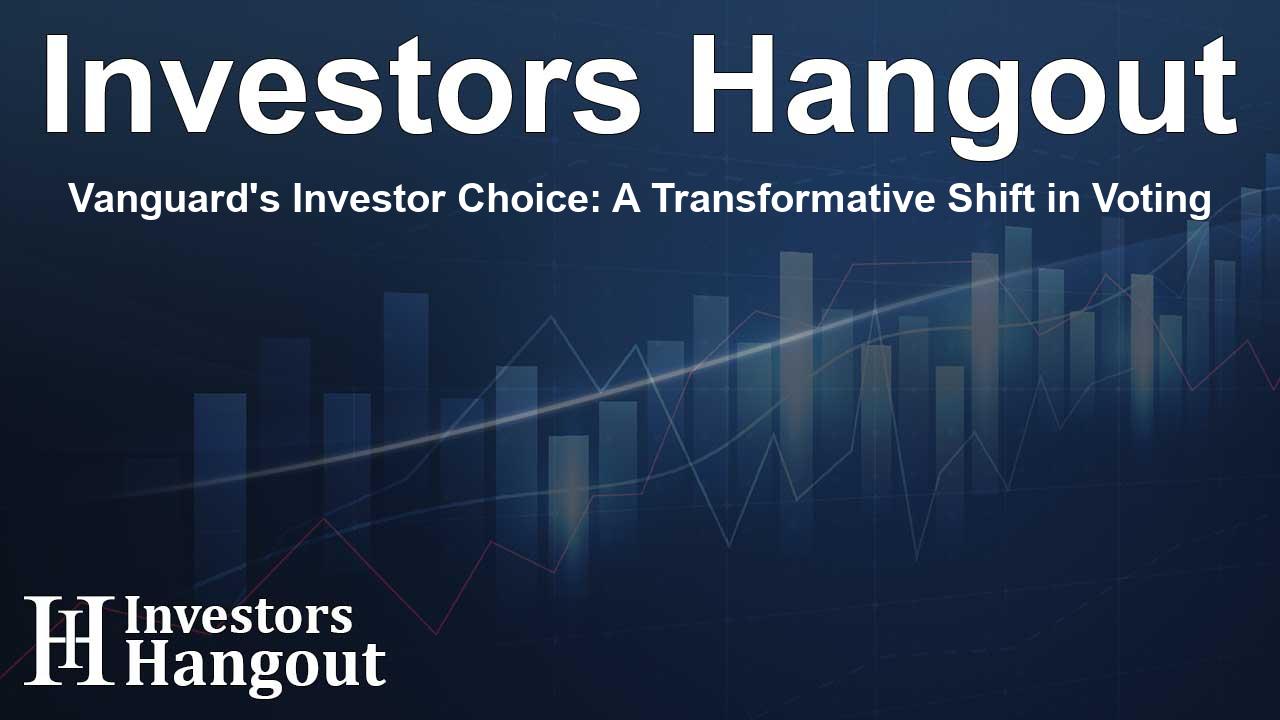Vanguard's Investor Choice: A Transformative Shift in Voting

Vanguard's Investor Choice Shows Dramatic Growth
Vanguard has recently unveiled exciting insights from its Investor Choice pilot program, indicating a significant surge in investor engagement during the proxy voting season. This initiative has more than doubled participation, showcasing an impressive commitment from individual investors eager to have a say in critical decisions pertaining to portfolio companies.
Since its launch in early 2023, the Investor Choice program has risen to prominence, evolving into the largest individual investor proxy voting initiative available. Currently, it encompasses 12 equity index funds with total assets exceeding $1 trillion. This remarkable growth highlights the movement towards empowering investors in their decisions.
Empowering Investors with a Voice
John Galloway, Vanguard's Global Head of Investment Stewardship, stated, "For more than 50 years, Vanguard has made investing more accessible for everyday investors. Investor Choice carries forward that legacy by ensuring that investors and their fiduciaries can align their portfolios with personal goals and preferences." The data from this proxy season shows increasing interest among investors for choices in voting policies and reinforces the concept of representing diverse perspectives on proxy matters.
Key Findings from the 2025 Proxy Season
In the recent proxy season, over 82,000 Vanguard investors participated in the Investor Choice program—more than doubling the numbers recorded in 2024. The data reveal several noteworthy trends:
- Policy Selection Diversity: The voting landscape is rapidly changing, as evidenced by the dispersion in policy selection; no single policy garnered more than 35% of investor votes. This diverse interest underscores the varying perspectives present within the investing community.
- Plan Sponsor Inclusion: In 2024, Vanguard broadened the scope of the Investor Choice program, allowing retirement plan sponsors to join. Consequently, plan sponsors with over 100,000 participants engaged in the program during the 2025 season.
- Shifting Preferences: A notable 65% of investors opted for policy options outside of the Vanguard-Advised Funds policy, indicating a significant shift from previous years. In contrast, support for the Glass Lewis ESG Policy decreased for the second consecutive year, dropping to 17.6%.
- ESG Engagement Differences: Investors involved in the Vanguard ESG U.S. Stock ETF exhibited a strong preference for the Glass Lewis ESG policy, selecting it at a rate four times higher than the overall participating population.
- Demographic Influences: Younger investors demonstrated a pronounced preference for the Glass Lewis ESG Policy, with 42% of individuals aged 44 and younger selecting it, compared to only 17% of older investors.
Vanguard’s Commitment to Individual Investor Interests
David Reiner, the Head of Investor Choice at Vanguard, emphasized the foundational beliefs of the program: investors should have a say in how their shares are voted, enabling informed and engaged participants in corporate governance. This approach fosters a robust governance system by offering individual investors access to diverse viewpoints.
The Future of Investor Choice
As Vanguard continues to enhance the Investor Choice program, the firm remains committed to representing the interests of all investors in U.S. equity index funds. The ongoing success of this initiative highlights a dynamic shift in engagement levels, with a clear understanding that investors desire a voice in determining the future path of their investments.
To dive deeper into the voting policy options and learn more about Vanguard's unwavering commitment to its clients, interested parties can explore comprehensive reports and insights available through Vanguard's resources.
Frequently Asked Questions
What is the purpose of Vanguard's Investor Choice program?
The Investor Choice program aims to empower individual investors, allowing them to participate actively in proxy voting decisions and to align their investment goals with their policy preferences.
How many investors participated in the program during the 2025 proxy season?
Over 82,000 Vanguard investors engaged in the Investor Choice program during the 2025 proxy season, marking a significant increase from previous years.
What are the key trends observed in the 2025 proxy season?
Key trends include a diverse range of voting policy selections, expansion to retirement plan sponsors, and significant shifts in investor preferences compared to previous years.
What demographic factors influence voting policy selection?
Data indicates that younger investors are more inclined to choose certain policies, such as the Glass Lewis ESG Policy, compared to older demographics.
How can investors learn more about their proxy voting options?
Investors can obtain further information about proxy voting policies and choices by exploring Vanguard's official resources and reports on the subject.
About The Author
Contact Evelyn Baker privately here. Or send an email with ATTN: Evelyn Baker as the subject to contact@investorshangout.com.
About Investors Hangout
Investors Hangout is a leading online stock forum for financial discussion and learning, offering a wide range of free tools and resources. It draws in traders of all levels, who exchange market knowledge, investigate trading tactics, and keep an eye on industry developments in real time. Featuring financial articles, stock message boards, quotes, charts, company profiles, and live news updates. Through cooperative learning and a wealth of informational resources, it helps users from novices creating their first portfolios to experts honing their techniques. Join Investors Hangout today: https://investorshangout.com/
The content of this article is based on factual, publicly available information and does not represent legal, financial, or investment advice. Investors Hangout does not offer financial advice, and the author is not a licensed financial advisor. Consult a qualified advisor before making any financial or investment decisions based on this article. This article should not be considered advice to purchase, sell, or hold any securities or other investments. If any of the material provided here is inaccurate, please contact us for corrections.
